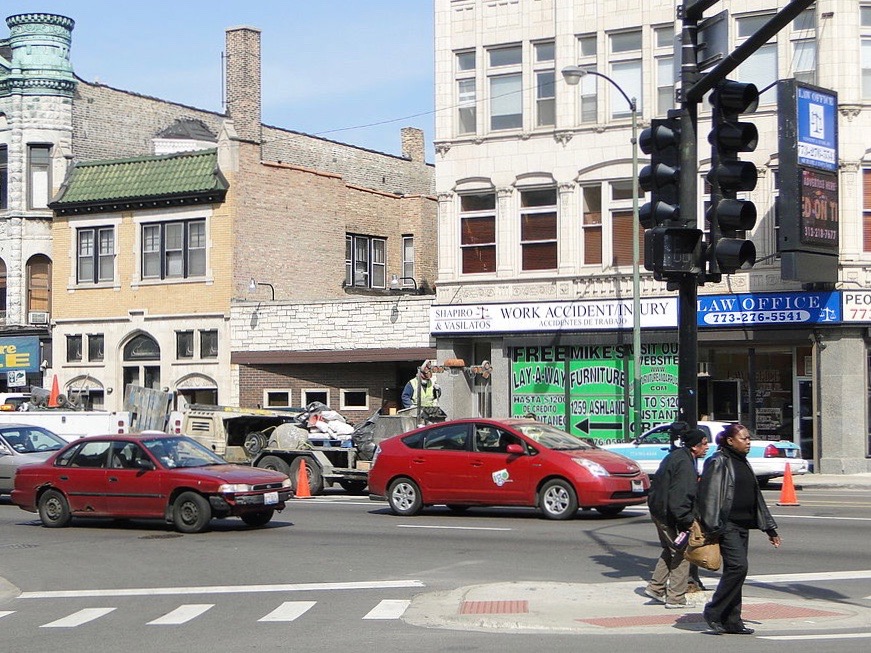Illinois prone to census undercount
Chicago Urban League calls for investment, outreach to avoid loss of $1B in funding, congressional seat
Pedestrians walk in Chicago’s West Town neighborhood at Division Street and Milwaukee Avenue. (Wikimedia Commons/Adam Jones)
By Ted Cox
A new study finds Illinois to be particularly prone to an undercount by the U.S. Census, at the possible cost of more than $1 billion in federal funding and seats in Congress.
The Chicago Urban League issued the report “Money and Power: The Economic and Political Impact of the 2020 Census on Illinois” on Tuesday. It found “Illinois remains at high risk of a population undercount due to significant barriers to census participation and the state’s large population of hard-to-count residents.”
The census is intended to count all state residents, in part to allot federal funding and assure accurate representation in Congress, where the House of Representatives is based on population.
Yet the study ranked Illinois sixth in the nation on difficulty of counting all its residents. Stereotypically, minority groups are hardest to count, especially African Americans, making Chicago particularly problematic, but the study pointed out that the U.S. Census Bureau identifies a range of “Hard to Count” citizens, including children under 5, rural residents, renters, ethnic and racial minorities, immigrants, non-English speakers, those without access to the internet, young mobile people, and disabled and low-income residents.
“While African Americans historically have been the hardest-to-count racial group, there is currently a high level of distrust about the federal government and the census that cuts across all groups, including rural residents, Latinx, immigrants, and others,” said Kathie Kane-Willis, director of policy and advocacy at the Urban League and a member of the Illinois Complete Count Commission. “That’s why it’s especially important for the state to fund ‘Get Out the Count’ initiatives. A $1.2 billion loss over a decade is hardly chump change.”
“A $1.2 billion loss over a decade is hardly chump change.”
Kathie Kane-Willis (One Illinois/Ted Cox)
The study projects that “an undercount would lead to a decrease in the federal funding that sustains more than 100 critical programs across the state — including Medicaid, which could be cut by about $122 million a year.” It projects similar losses in other federal programs like student loans, food stamps, and highway funding.
According to the Urban League: “Illinois’s black residents are among the hardest to count, with nearly 42 percent living in Hard to Count census tracts. Similarly, about 33 percent of Latinx residents and nearly 20 percent of children under age 5 live in Hard to Count areas. Together, these residents account for more than 1.67 million of the state’s population.”
And it’s not just a Chicago problem. The study cites that Cook County had the highest non-response rate on the 2010 U.S. Census questionnaire at 25 percent, but fueled by a distrust in government downstate Jackson, Champaign, Alexander, and St. Clair counties all posted a 23 percent non-response rate.
Members of the Illinois congressional delegation have already raised the issue of President Trump trying to include a citizenship question in the 2020 Census. They charge that the census is intended to count all residents, not just U.S. citizens, and that question is meant to discourage responses from undocumented immigrants and others who might know someone who’s undocumented or have an undocumented immigrant living with them.
The study additionally warns that, with the census “moving primarily online,” that would slight households without internet access. It also cites that projections are for “on-the-ground enumerators” to be cut by a third from 2010 levels, from 600,000 to 400,000.
Illinois is already facing the possible loss of one of its 18 U.S. representatives due to population loss through the middle of the decade, and the study warns an undercount could cost another seat.
“From Chicago to Cairo, from Springfield to the Quad Cities, this is one issue all Illinoisans can agree on – we need an accurate count because we cannot afford to lose money or power, especially in this tight fiscal environment,” said Barbara Lumpkin, interim president of the Chicago Urban League. “Both the city and the state have been experiencing population loss in recent years, due in part to limited resources and opportunities in many communities. However, millions of people still call Chicago and Illinois home. Adequate funding will be essential to ensuring an accurate census count and, therefore, helping to make communities more livable, stem population loss, and attract more people to our state.”
The study urges the state to allot $33 million in an attempt to encourage participation in the 2020 U.S. Census, “targeted toward Hard to Count populations across the state.” It’s also calling for the full funding of the Illinois Complete Count Commission.


